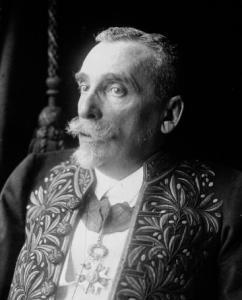p 596 | penates = Roman deities, household gods of the Romans & other Latin peoples.

Non sine labore means Nothing is gained without effort (motto of the Cardinal de Retz) (Sturrock)
p 596 | Hydrophobia, the historic name for rabies, especially a set of symptoms of its later stages, where the victim has difficulty swallowing, shows panic when presented with liquids to drink, and cannot quench its/their thirst.
p 604 | Parmi les hommes: means among men. Henry Roujon was an academic, essayist and novelist, elected member of the Académie française in 1911. The real title of the book was Au milieu des hommes (which also means among men or in the midst of men, and it was a collection of critical essays. (Storrock)
 |
| Roujon |
p 606 | Joseph-Raymond, comte Fournier-Sarlovèze (1836-1916) was an adminstrator and art historian, who created a connoisseurs' club in 1904 called La Société artistiques des amateurs.
p 611 | "It's so beautiful...: the satanic Carlos Herrera, alias Vautrin, had "befriended," first Eugène de Rastignac (in Le Pere Goriot) and then Lucien de Rubempré, who is with him when they find themselves passing Rastignac; Tristesse d'Olympio is one of Victor Hugo's best-known and beautiful poems, in which he revisits the scenes where he first fell in love with his mistress, Juliette Drouet. (Sturrock)
Perhaps this will help: "Honoré de Balzac’s Gay Anti-Hero" (an essay by Robert W. Mack):
Nearly 200 years ago, the French novelist Honoré de Balzac created a remarkable character, Vautrin, a charming, hyper-masculine master criminal, and a man who loves men. In three of Balzac’s most popular novels an important part of the plot turns on Vautrin’s love for an exceptionally handsome, much younger man: 21-year-old Eugène de Rastignac in Père Goriot, twenty-year-old Lucien de Rubempré in the climactic scene of Lost Illusions and in A Harlot High and Low (Splendeurs et misères) and 27-year-old Théodore Calvi (nicknamed “Madeleine”), who doesn’t appear until the end of the last book, when Vautrin is around fifty, but who had also been involved with Vautrin a decade before, at the age of eighteen.p 611 | The "man of taste" was Oscar Wilde, who in his essay "The Decay of Lying" wrote, "One of the greatest tragedies of my life is the death of Lucien de Rubempré in Splendeurs et misères."
Honoré de Balzac (1799–1850) was a French novelist and playwright. La Comédie humaine (The Human Comedy) is the title of his multi-volume collection of interlinked novels and stories depicting French society in the period of the Restoration and the July Monarchy (1815–1848). The Comédie humaine consists of 91 finished works (stories, novels or analytical essays) and 46 unfinished works (some of which exist only as titles).
